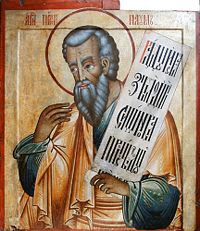- Nahum
-
For the prophetic book, see Book of Nahum.For other uses, see Nahum (disambiguation).
 Russian Orthodox icon of the Prophet Nahum, 18th century (Iconostasis of Transfiguration Church, Kizhi Monastery, Karelia, Russia).
Russian Orthodox icon of the Prophet Nahum, 18th century (Iconostasis of Transfiguration Church, Kizhi Monastery, Karelia, Russia).
Nahum (
 /ˈneɪ.əm/ or /ˈneɪhəm/; Hebrew: נַחוּם Naḥūm) was a minor prophet whose prophecy is recorded in the Hebrew Bible. His book comes in chronological order between Micah and Habakkuk in the Bible.[1] He wrote about the end of the Assyrian Empire, and its capital city, Nineveh, in a vivid poetic style.[2]
/ˈneɪ.əm/ or /ˈneɪhəm/; Hebrew: נַחוּם Naḥūm) was a minor prophet whose prophecy is recorded in the Hebrew Bible. His book comes in chronological order between Micah and Habakkuk in the Bible.[1] He wrote about the end of the Assyrian Empire, and its capital city, Nineveh, in a vivid poetic style.[2]Little is known about Nahum’s personal history. His name means "comforter," and he was from the town of Alqosh, (Nah 1:1) which scholars have attempted to identify with several cities, including the modern `Alqush of Assyria and Capharnaum of northern Galilee.[3] He was a very nationalistic Hebrew however and lived amongst the Elkoshites in peace. His writings could be taken as prophecy or as history. One account suggests that his writings are a prophecy written in about 615 BC, just before the downfall of Assyria, while another account suggests that he wrote this passage as liturgy just after its downfall in 612 BC.[4][5]
Contents
Current status
The tomb of Nahum is supposedly inside the synagogue at Alqosh, although there are other places outside Iraq that lay claim also to being the original “Elkosh” from which Nahum hailed. Alquosh was abandoned by its Jewish population in 1948, when they were expelled, and the synagogue that purportedly houses the tomb is in a poor structural state, to the extent that the tomb itself is in danger of destruction. The tomb underwent basic repairs in 1796. When all Jews were compelled to flee Alqosh in 1948, the iron keys to the tomb were handed to a Chaldean man by the name of Sami Jajouhana. Few Jews visit the historic site, yet Jajouhana continues to keep the promise he made with his Jewish friends, and looks after the tomb.[6] A team of US/UK construction engineers, led by Huw Thomas, is currently planning ways to save the building and the tomb.[7] Money has been allocated for proposed renovation in 2008. In secular sources, Ninaveh is first mentioned in the Code of Hammurabi(2200 B.C). Hammurabi calls himself the king who made the name of the goddess Ishthar famous in the temple of Ishthar in Ninaveh.
Liturgical commemoration
The Prophet Nahum is venerated as a saint in Eastern Christianity. On the Eastern Orthodox liturgical calendar, his feast day is December 1[8][9][10](for those churches which follow the traditional Julian Calendar, December 1 currently falls on December 14 of the modern Gregorian Calendar). He is commemorated with the other minor prophets in the Calendar of saints of the Armenian Apostolic Church on July 31.
References
- ^ Although this has been questoned by many biblical scholars. Most now believe that Nahum shouldn't belong in the Bible. "The Chronology of Biblical Prophets", Adapted from Hauer, C.E. & Young, W. A., An Introduction to the Bible: A Journey into Three Worlds, p.123, Englewood Cliffs, NJ: Prentice-Hall, 1994
- ^ Introduction to Nahum at the International Bible Society website
- ^ Nahum at The Catholic Encyclopedia
- ^ Heaton, E. W., A Short Introduction To The Old Testament Prophets, p. 35, Oneworld Publications, P.O. Box 830, 21 Broadway, Rockport, NA 01966, ISBN 1-85168-114-0
- ^ Nahum at aboutbibleprophecy.com
- ^ Chaldean Man Keeps Promise With Jewish Friends
- ^ RENOVATION - AL QUSH SYNAGOGUE AND THE TOMB OF NAHUM at tombofnahum.com
- ^ Great Synaxaristes: (Greek) Ὁ Προφήτης Ναούμ. 1 Δεκεμβρίου. ΜΕΓΑΣ ΣΥΝΑΞΑΡΙΣΤΗΣ.
- ^ Prophet Nahum. OCA - Feasts and Saints.
- ^ December 1. The Roman Martyrology.
External links
- Nahum article from The Catholic Encyclopedia
- Renovation - Al Qush Synagogue and the Tomb of Nahum
- Prophet Nahum Orthodox icon and synaxarion
 Chisholm, Hugh, ed (1911). "Nahum". Encyclopædia Britannica (11th ed.). Cambridge University Press.
Chisholm, Hugh, ed (1911). "Nahum". Encyclopædia Britannica (11th ed.). Cambridge University Press.
Prophets in the Hebrew Bible Pre-Patriarchs (Bible) Patriarchs and Matriarchs Israelite prophets
in the TorahProphets mentioned
in the Former ProphetsMajor Prophets Minor Prophets Noahide prophets Other prophets Italics denote that the status as a prophet is not universally accepted. · rl are articles dealing with the prophet within Rabbinic Literature.Categories:- Prophets of the Hebrew Bible
- 7th-century BC people
- Old Testament saints
- Eastern Orthodox saints
- Fertile Crescent
Wikimedia Foundation. 2010.
